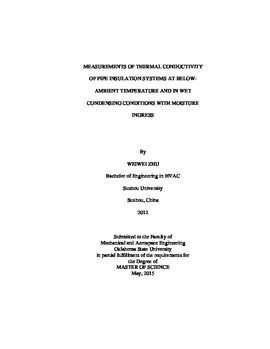| dc.contributor.advisor | Cremaschi, Lorenzo | |
| dc.contributor.author | Zhu, Weiwei | |
| dc.date.accessioned | 2016-04-15T21:49:44Z | |
| dc.date.available | 2016-04-15T21:49:44Z | |
| dc.date.issued | 2015-05-01 | |
| dc.identifier.uri | https://hdl.handle.net/11244/33467 | |
| dc.description.abstract | When pipes are used for chilled water, glycol brines, refrigerants, and other chilled fluids, energy must be spent to compensate for heat gains through the wall of the pipes. Higher fluid temperature at the point of use decreases the efficiency of the end-use heat exchangers and increases the parasitic energy consumption. Mechanical pipe insulation systems are often used to limit the heat gains and save energy in commercial buildings. Pipe insulation systems play an important role for the health of the occupied space. When a chilled pipe is uninsulated or inadequately insulated, condensation might occur and water will drip onto other building surfaces possibly causing mold growth. The critical issue with cold pipes is that the temperature difference between the pipe and its surrounding ambient air drives water vapor in to the insulation system and condensation commonly occurs when the water vapor comes in contact with the chilled pipe surface. This thesis experimentally studies this issue for pipe insulation systems operating at below ambient temperature. The moisture content and the associated thermal conductivity of several pipe insulation systems were measured at various wet condensing conditions with moisture ingress. Accelerated type tests in laboratory showed the propensity of moisture accumulation in several insulation systems due to the cylindrical configuration, split joints, and micro-imperfections in the jacketing system. The data in the present work showed that the thermal conductivity increased systematically when water vapor entered the pipe insulation system. | |
| dc.format | application/pdf | |
| dc.language | en_US | |
| dc.publisher | Oklahoma State University | |
| dc.rights | Copyright is held by the author who has granted the Oklahoma State University Library the non-exclusive right to share this material in its institutional repository. Contact Digital Library Services at lib-dls@okstate.edu or 405-744-9161 for the permission policy on the use, reproduction or distribution of this material. | |
| dc.title | Measurement of Thermal Conductivity of Pipe Insulation Systems at below Ambient Temperature and in Wet Condensing Conditions with Moisture Ingress | |
| dc.type | text | |
| dc.contributor.committeeMember | Ghajar, Afshin | |
| dc.contributor.committeeMember | Sallam, Khaled | |
| osu.filename | Zhu_okstate_0664M_13760.pdf | |
| osu.accesstype | Open Access | |
| dc.description.department | Mechanical & Aerospace Engineering | |
| dc.type.genre | Thesis | |
